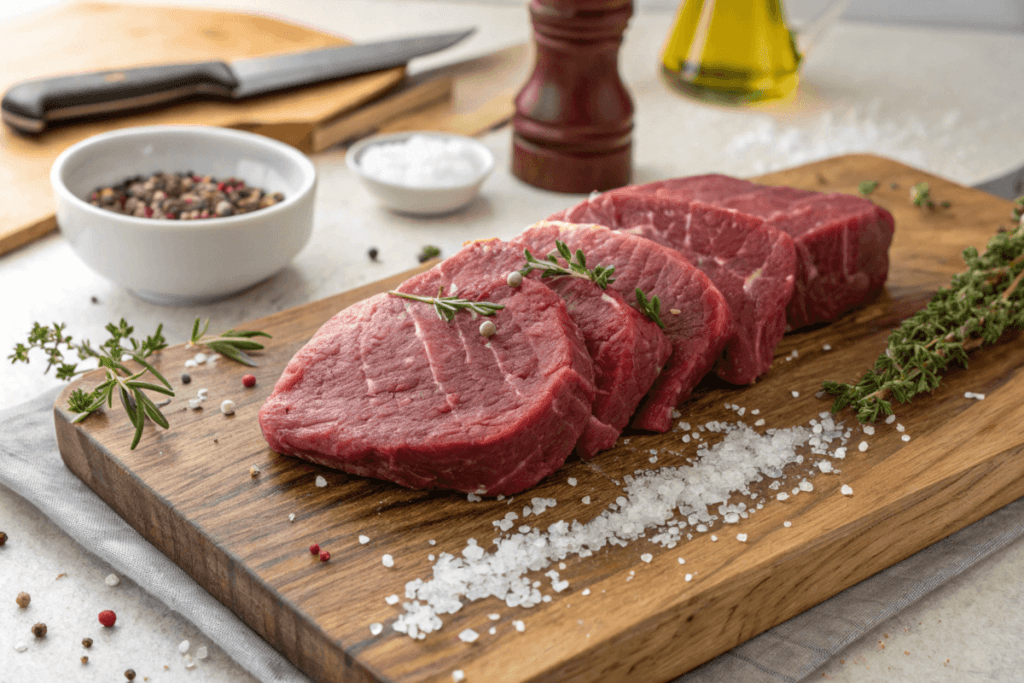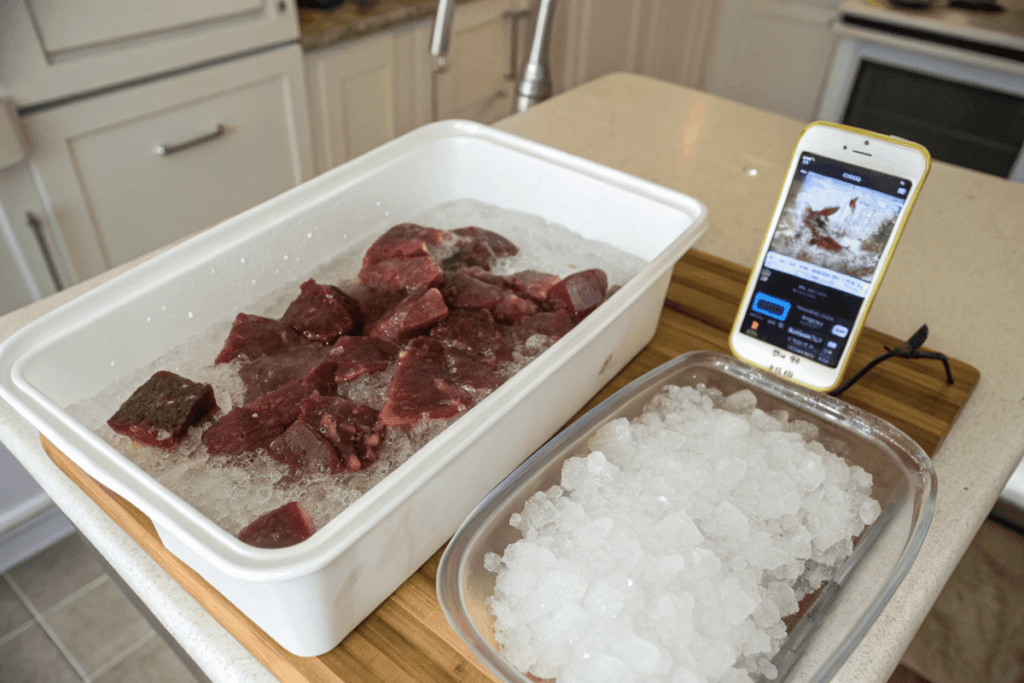How long should you soak deer meat in salt? Deer meat, also known as venison, is a popular choice for many hunters and meat lovers alike. However, it is crucial to prepare it properly to achieve the best flavor and tenderness. One of the most common techniques used is soaking the meat in salt. But how long should you soak deer meat in salt for optimal results? In this article, we’ll explore different soaking methods, the benefits of soaking, and answer common questions that people often have about preparing venison. By the end, you’ll have a clear understanding of how to achieve the best texture and flavor for your deer meat.
Table of Contents
Why Soak Deer Meat in Salt?
Soaking deer meat in salt serves several important purposes that ultimately lead to a better taste and eating experience. Venison has a distinct flavor that can be challenging for some people due to its gamey taste. Proper preparation, including soaking in salt, can help make the meat more enjoyable for a wider audience.
Benefits of Soaking Deer Meat in Salt Water
- Removes Excess Blood: Deer meat can sometimes have a strong gamey flavor, primarily due to excess blood. Soaking deer meat in salt water helps draw out that blood and reduce the intensity of the flavor. Blood in meat often contributes to the metallic or off-putting taste, which can be removed with proper soaking.
- Tenderizes the Meat: Salt helps break down the proteins in venison, making it more tender. Unlike other types of meat, venison tends to be lean with less fat, which makes it prone to being tough. Saltwater soaking helps soften the muscle fibers, resulting in a tender texture that is easier to cook and enjoy.
- Enhances Flavor: Salt soaking not only tenderizes but also enhances the natural flavors of the meat. It creates a balanced seasoning effect, allowing other flavors—such as herbs, spices, and marinades—to penetrate the meat more effectively when cooked.
How Long Should You Soak Deer Meat in Salt Water?
The length of time you should soak deer meat in salt depends on your objective. Some people prefer soaking for a shorter period to remove blood, while others aim to tenderize the meat for a more extended time. Here, we explore different scenarios and recommend the best duration for each.
For Removing Excess Blood
If your goal is to remove excess blood and minimize the gamey taste, you should soak the deer meat for 2 to 4 hours. This duration allows the saltwater to effectively draw out impurities without changing the meat’s texture significantly. It’s especially helpful if you plan to use additional seasoning or marinade after the initial soak.
- How to Soak: Use cold water and a salt-to-water ratio of 1 cup of salt per gallon of water. Submerge the meat entirely, and if the water turns red quickly, replace it halfway through the process.
- Tip: To reduce the gamey flavor even more, you can add a tablespoon of vinegar to the saltwater solution. Vinegar helps break down the blood and connective tissues, further enhancing the flavor.
For Tenderizing
If you wish to tenderize the meat as well, then a longer soak is ideal. In such cases, you should let the deer meat sit in salt water for 12 to 24 hours. The salt will continue to break down the fibers in the meat, making it tenderer.
- How to Soak: Place the deer meat in a large container with enough cold, salted water to cover it. Keep it refrigerated throughout the soaking process to ensure that the meat stays fresh and safe to eat.
- Important Note: When soaking for more than 12 hours, change the saltwater every 6 to 8 hours. This ensures that impurities continue to be drawn out and the meat doesn’t become overly salty.

For Improved Flavor and Marination
For those who are looking to go beyond just removing blood and tenderizing, using a salt soak as a precursor to marination is highly recommended. After soaking in salt water for up to 12 hours, you can then transfer the meat to a flavorful marinade for an additional 12 to 24 hours.
- Marination Tips: Popular marinades for venison include combinations of olive oil, garlic, soy sauce, Worcestershire sauce, herbs like rosemary, thyme, and acid components like vinegar or citrus juice.
- Double Benefit: This two-step process—salt soaking followed by marination—ensures both tenderness and flavor, making your venison the highlight of any meal.
If you’re interested in learning more about brining techniques and the impact they have on meat, this article on brining provides an in-depth overview.
The Science Behind Soaking Venison
How Salt Affects Meat Fibers
Soaking meat in a salt solution triggers osmosis, a process that transforms the texture and flavor of the meat. The salt initially pulls moisture from the meat’s cells, which may seem counterintuitive. Over time, the salt breaks down the proteins in the muscle fibers. This breakdown allows the meat to hold more moisture during cooking, creating a juicier and more tender result.
Salt also softens the tough connective tissues found in meat, especially in wild game like venison. Since venison contains very little intramuscular fat, or marbling, it significantly benefits from soaking or brining. These methods improve both the tenderness and the overall eating experience, making the meat more enjoyable.
Gamey Flavor Explained
The gamey flavor of venison is due to the presence of blood and specific fatty acids that are different from farm-raised animals. Unlike beef or pork, deer forage on a varied diet, which consequently affects the flavor of their meat. Additionally, the presence of blood and specific pheromones can make venison taste quite strong. However, soaking in saltwater helps reduce these elements, thereby making the flavor milder and more appealing to a broader audience.
Alternative Soaking Methods
While soaking deer meat in salt is one of the most popular methods, there are alternative methods that are also effective. Depending on your desired flavor and texture, you might consider the following options:
Buttermilk Soak
Buttermilk is a fantastic alternative for soaking deer meat. It’s often used for tenderizing poultry, but it works wonders for venison as well.
- Benefits: Buttermilk contains lactic acid, which helps break down the muscle fibers and also neutralizes the gamey taste. It adds a subtle, tangy flavor to the meat.
- How to Use: Submerge the deer meat in buttermilk for 8 to 12 hours. Keep it refrigerated and cover the container to prevent the meat from absorbing any unwanted refrigerator smells.
- Recommended Dishes: Buttermilk-soaked venison is perfect for frying or grilling, as it leaves the meat tender and with a slight tang that pairs well with spices.
Vinegar-Based Solutions
Another popular method is to soak venison in a diluted vinegar solution.
- Benefits: The acidity of vinegar breaks down tough tissues and helps eliminate some of the gamey flavor. This method is great for people who want to cook venison with bold flavors.
- How to Use: Use a mixture of 1 part vinegar to 3 parts water and soak for 2 to 4 hours. Avoid soaking for too long, as vinegar can make the meat overly acidic and affect the texture negatively.
Milk Soak
Soaking deer meat in milk is similar to buttermilk but results in a milder flavor.
- Benefits: Milk helps neutralize any gamey taste and tenderizes the meat slightly. This method works well if you’re planning to cook the venison in stews or soups.
- How to Use: Simply cover the meat with milk and refrigerate for 4 to 6 hours. Rinse and pat dry before cooking.
Step-by-Step Guide to Soaking Deer Meat in Salt Water
Here’s a detailed guide to help you soak deer meat properly to achieve the best results.
Prepare the Salt Solution
Mix 1 cup of salt with 1 gallon of cold water. Stir until the salt is fully dissolved. You can also add ice to keep the solution extra cold, especially if soaking for an extended period.
Submerge the Meat
Place the deer meat in a large container and pour the saltwater solution over it. Make sure all parts of the meat are fully submerged.
Refrigerate
Keep the container in the refrigerator or in a cooler with ice. Venison must be kept cold throughout the soaking process to avoid spoilage.
Replace the Saltwater as Needed
If the water becomes discolored, drain it and replace it with a fresh batch of saltwater. This is especially important during long soaks to ensure that the meat remains fresh.
Rinse Thoroughly
After soaking, rinse the meat thoroughly under cold running water to remove excess salt.
Pat Dry
- Use paper towels to pat the meat dry. This will help prevent any excess moisture from affecting the cooking process.
What is the Best Thing to Soak Deer Meat In?
Salt water is not the only option for soaking deer meat. Each method has its unique advantages, and the best option depends on your intended cooking method and personal preferences.
Comparing Soaking Solutions
| Soaking Solution | Benefits | Recommended Soaking Time |
|---|---|---|
| Salt Water | Removes blood, tenderizes meat | 2-24 hours |
| Buttermilk | Neutralizes gamey flavor, adds tang | 8-12 hours |
| Vinegar Solution | Tenderizes, eliminates strong flavor | 2-4 hours |
| Milk | Mildly tenderizes, neutralizes flavor | 4-6 hours |
For different types of dishes, you may choose different soaking methods. For grilling, a buttermilk soak might be the best, while saltwater is perfect for most general cooking purposes.
Cooking Deer Meat After Soaking
Once you’ve soaked the deer meat, it’s time to cook it. Cooking venison properly is just as important as preparing it. Here are some tips for cooking deer meat after soaking.
Grilling
- Marinate After Soaking: For the best flavor, marinate the venison in your choice of seasonings after soaking. Olive oil, garlic, and herbs like rosemary and thyme work well.
- Cook to Medium-Rare: Venison is best when cooked to medium-rare (about 135°F internal temperature). Overcooking can make it tough.
- Let It Rest: Allow the meat to rest for about 5-10 minutes after grilling to let the juices redistribute.
Pan-Searing
- Season Generously: Use salt, pepper, and your favorite spices after soaking. Pan-searing gives venison a beautiful crust that locks in the moisture.
- Use Butter and Herbs: Adding butter, garlic, and thyme to the pan while searing enhances the flavor and keeps the meat tender.
Slow Cooking
- Perfect for Tough Cuts: Tougher cuts of venison benefit from slow cooking methods, like braising or using a slow cooker. After soaking, cook with vegetables and broth for several hours to achieve a tender texture.
- Add Acidity: Adding a little vinegar or wine helps break down the meat even further, making it more flavorful.

Frequently Asked Questions
How Long Should I Soak Deer Meat in Salt Water?
It depends on your goal. For removing excess blood, soak for 2 to 4 hours. For tenderizing, a 12 to 24-hour soak is recommended.
How Long Can Meat Soak in Salt Water?
Meat can be soaked in salt water for up to 24 hours. Any longer, and the meat may become overly salty or mushy. Always keep it refrigerated to prevent spoilage.
What is the Best Thing to Soak Deer Meat In?
In addition to salt water, buttermilk is also a popular choice. Buttermilk helps tenderize the meat while adding a subtle flavor. Vinegar-based marinades can also be used for a tangier taste.
How Long Can You Leave Venison in a Brine?
Venison can be left in a brine for up to 48 hours. However, always check the recipe or the specific brine’s ingredients to avoid over-brining. Over-brining can make the meat overly salty and change its texture.

